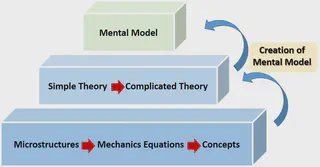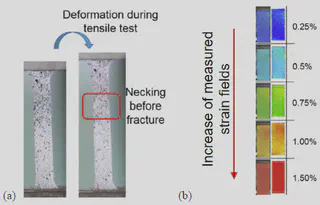🔬 Scales in Mechanics Education: Reflections on the M³E Module
 Image credit: ASEE 2020 – Multiscale Module Framework
Image credit: ASEE 2020 – Multiscale Module FrameworkUnderstanding solid mechanics shouldn’t feel like memorizing equations. The M³E module, introduced by Herren et al. (ASEE 2020 paper), presents a compelling framework that connects material microstructures and macro behavior through SEM imaging, DIC-based strain fields, and student-built concept maps.
📷 Example: Strain field visualization during tensile testing - (a) Aluminum tensile samples with painted DIC patterns; (b) 2D strain fields of the
gauge area during tensile tests.
I wasn’t involved in the paper, but as an educator, I see strong potential here. Students go beyond formulas and begin asking:
🧠 How does grain structure affect crack propagation?
📈 What does stress look like in real-time?
This modular and visual approach builds mental models that last far beyond exams—and that’s the kind of mechanics education we need.
📚 References
- Herren, B. et al. (2020). Development of Multiscale Experimentation and Visualization Module for Undergraduate Mechanics Education. ASEE. NSF Link
- Seel, N. M., & Dinter, F. R. (1995). Instruction and Mental Model Progression. Educational Research and Evaluation.